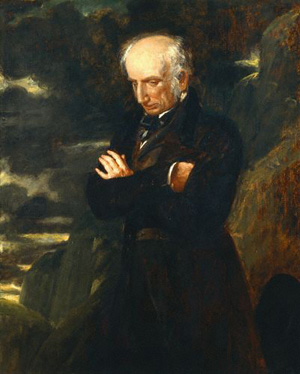To Joanna
William Wordsworth
Written at Grasmere. The effect of her laugh is an extravagance; though the effect of the reverberation of voices in some parts of the mountains is very striking. There is, in the "Excursion," an allusion to the bleat of a lamb thus re-echoed, and described without any exaggeration, as I heard it, on the side of Stickle Tarn, from the precipice that stretches on to Langdale Pikes.
Amid the smoke of cities did you pass
The time of early youth; and there you learned,
From years of quiet industry, to love
The living Beings by your own fireside,
With such a strong devotion, that your heart
Is slow to meet the sympathies of them
Who look upon the hills with tenderness,
And make dear friendships with the streams and groves.
Yet we, who are transgressors in this kind,
Dwelling retired in our simplicity
Among the woods and fields, we love you well,
Joanna! and I guess, since you have been
So distant from us now for two long years,
That you will gladly listen to discourse,
However trivial, if you thence be taught
That they, with whom you once were happy, talk
Familiarly of you and of old times.
While I was seated, now some ten days past,
Beneath those lofty firs, that overtop
Their ancient neighbour, the old steeple-tower,
The Vicar from his gloomy house hard by
Came forth to greet me; and when he had asked,
"How fares Joanna, that wild-hearted Maid!
And when will she return to us?" he paused;
And, after short exchange of village news,
He with grave looks demanded, for what cause,
Reviving obsolete idolatry,
I, like a Runic Priest, in characters
Of formidable size had chiselled out
Some uncouth name upon the native rock,
Above the Rotha, by the forest-side.
--Now, by those dear immunities of heart
Engendered between malice and true love,
I was not loth to be so catechised,
And this was my reply:-"As it befell,
One summer morning we had walked abroad
At break of day, Joanna and myself.
--'Twas that delightful season when the broom,
Full-flowered, and visible on every steep,
Along the copses runs in veins of gold.
Our pathway led us on to Rotha's banks;
And when we came in front of that tall rock
That eastward looks, I there stopped short--and stood
Tracing the lofty barrier with my eye
From base to summit; such delight I found
To note in shrub and tree, in stone and flower
That intermixture of delicious hues,
Along so vast a surface, all at once,
In one impression, by connecting force
Of their own beauty, imaged in the heart.
--When I had gazed perhaps two minutes' space,
Joanna, looking in my eyes, beheld
That ravishment of mine, and laughed aloud.
The Rock, like something starting from a sleep,
Took up the Lady's voice, and laughed again;
That ancient Woman seated on Helm-crag
Was ready with her cavern; Hammar-scar,
And the tall Steep of Silver-how, sent forth
A noise of laughter; southern Loughrigg heard,
And Fairfield answered with a mountain tone;
Helvellyn far into the clear blue sky
Carried the Lady's voice,--old Skiddaw blew
His speaking-trumpet;--back out of the clouds
Of Glaramara southward came the voice;
And Kirkstone tossed it from his misty head.
--Now whether (said I to our cordial Friend,
Who in the hey-day of astonishment
Smiled in my face) this were in simple truth
A work accomplished by the brotherhood
Of ancient mountains, or my ear was touched
With dreams and visionary impulses
To me alone imparted, sure I am
That there was a loud uproar in the hills.
And, while we both were listening, to my side
The fair Joanna drew, as if she wished
To shelter from some object of her fear.
--And hence, long afterwards, when eighteen moons
Were wasted, as I chanced to walk alone
Beneath this rock, at sunrise, on a calm
And silent morning, I sat down, and there,
In memory of affections old and true,
I chiselled out in those rude characters
Joanna's name deep in the living stone:--
And I, and all who dwell by my fireside,
Have called the lovely rock, JOANNA'S ROCK."
William Wordsworth's (Author's) Note: In Cumberland and Westmoreland are several Inscriptions, upon the native rock, which, from the wasting of time, and the rudeness of the workmanship, have been mistaken for Runic. They are without doubt Roman.
The Rotha, mentioned in this poem, is the River which, flowing through the lakes of Grasmere and Rydale, falls into Wynandermere. On Helm-crag, that impressive single mountain at the head of the Vale of Grasmere, is a rock which from most points of view bears a striking resemblance to an old Woman cowering. Close by this rock is one of those fissures or caverns, which in the language of the country are called dungeons. Most of the mountains here mentioned immediately surround the Vale of Grasmere; of the others, some are at a considerable distance, but they belong to the same cluster.
